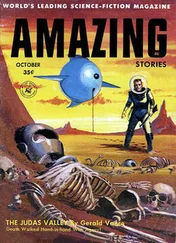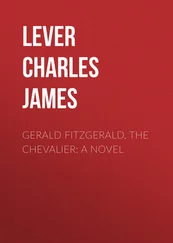‘But milord gave the horse and the linen to me, my friend,’ I said. ‘You heard him.’
He shouted: ‘Hey, Marie!’ and his wife came out. She was good-looking in the Flemish style – a skin like cream, and hair like copper. The cream soon goes cheesy, and the copper tarnishes; still, while their looks last, Flemish women, as you know, are very pretty, if you like something to get hold of (if you understand what I mean). Marie Morkens must have been a good twenty years younger than her hogshead of a husband, and she had the sleek look and something of the colouring of a fine, healthy, tortoise-shell cat. I remember that she had golden eyelashes; never trust a woman with fair eyelashes.
‘My darling,’ said Morkens, ‘did we hear milord giving his horse and his linen to this gentleman?’
She answered: ‘Of course not, my dear…. Hey, Cornelys, come here!’ Her voice was husky, yet penetrating, not unlike a cowbell in a mist.
Cornelys, the blacksmith, whose smithy was only twenty yards away, came running, hammer in hand, and stood open-mouthed, a veritable Vulcan with his leather apron and his blackened face. He stood, grinning like an idiot, rolling his inflamed eyes at the inn-keeper’s wife, with whom he was obviously head over heels in love.
‘Cornelys,’ said she, ‘you did not hear the English milord giving his horse and his linen to this gentleman here, did you?’
‘No.’
‘You heard him giving them to my husband, didn’t you?’
‘Did I? Oh yes, I remember now. That’s right; to your husband, certainly,’ said this idiot.
Morkens said: ‘So there you are!’
You know, my friend, that I am nicknamed ‘The Fox’. I am supposed to be incredibly clever. In point of fact, I am not; I pass as clever only because, in an emergency, I keep a cool head, hold my tongue, keep my temper, and wait to see which way the cat jumps. I hold by the old apophthegm To the ignorant much is told, moreover. I give away as little as possible, and prefer to profess, above all, an abysmal ignorance of foreign languages when in out-of-the-way places. In Flanders, for example, I pretended not to understand Flemish, although I understand it perfectly; thus I overheard many interesting things, as will soon be evident.
Now the woman turned to her husband and in the barbarous dialect of the locality – it always reminds me of a dog with a bone in his throat – said: ‘Joris, give him the horse. One side or the other will be advancing or retreating, any day now, and horses will be commandeered anyway.’
‘Give him the horse? Are you out of your mind, wife?’
She purred in her throat: ‘Give him the horse, I say, husband; and sell him a saddle.’
‘You are right, my heart.’
‘I am not your heart, you fat lump; I am your brain, you fool. Let me handle this,’ said she. Then to me, in French: ‘Nevertheless, monsieur, it is not in my character to see a traveller stranded in this God-forsaken mud. My husband is willing to lend you milord’s horse. A light rider like yourself can easily overtake milord’s coach, which will be going heavily, the roads being as they are. You can join milord at Flushing, and all’s well that ends well. No?’
I said, with simulated reluctance: ‘Very well. I see that I am outnumbered here. Shoe me the mare, and let me go.’
The blacksmith said: ‘Oh, as for that – ten minutes! The shoe is made.’
So I led the dapple-grey mare out of the stable, and to the forge. Madame Morkens accompanied me. She stood, hugging herself as if in secret delight at some incommunicable titillating thought, as such women will, while Cornelys went to work with rasp and hammer. That lovesick clown’s mind was not on his work. Every other second he paused to make sheep’s eyes at Madame Morkens. Once, indeed, while he was driving home the first nail, the mare Cocotte almost kicked him into his own fire.
‘Easy, there!’ I said. ‘Do you want to lame the beast?’
‘She’s vicious,’ he said.
‘You are clumsy,’ said I, ‘you are not nailing a plank to a joist!’
He cursed me obscenely in Flemish, and when I said: ‘I beg pardon?’ he said in French: ‘I was simply saying “You are quite right, monsieur.”’
So, at last, Cocotte was shod and I led her back to the inn. Madame Morkens lingered for a few seconds. I heard the smack of a boorish kiss, and when she joined me she was wiping soot from her face with her apron. And then the rain came down again – but what rain! Every drop hit the mud with a smack and a splash like a musket-ball.
The landlord had prepared some pleasant concoction of mulled spiced wine. He said: ‘Well, so now you have your horse, all right and tight…. No doubt monsieur is an expert bareback rider, like the ladies in the circus?’ I asked him what he meant, as if I did not know. He continued: ‘Monsieur proposes, no doubt, to ride to Flushing without a saddle?’
‘Oh – oh!’ said I. ‘I never thought of that. Oh dear!’
‘As luck will have it,’ he said, ‘I have a fine English hunting saddle, almost brand-new. I can let you have it dirt-cheap, if you like.’
‘I’d like to have a look at it,’ I said.
You see, it was my intention to have him saddle and harness Cocotte, and then, pretending to try the saddle for comfort, to get my feet in the stirrups, give the mare the edge of my heel, and so away.
But he said: ‘Oh, the saddle’s in the stable, and the rain is coming down in bucketfuls. Let it give over. Why hurry?’
The saddle was in the stable, then; that was something worth knowing.
She said: ‘In any case it will soon be dark, monsieur, and the roads are terrible. Best take your dinner at your ease and stay the night, and make a good start at daybreak,’ and gave her husband a quick, sidelong look that chilled my blood.
She had seen milord give me my pay, thirty guineas, and ten guineas over and above that, for a pourboire ; besides, I had twenty guineas more in my purse, some of it my own money and some of it petty cash for travelling expenses with which milord had entrusted me and of which I had neglected to remind him. And I have seen a throat cut for five francs in wayside inns in Flanders!
Morkens muttered in Flemish: ‘It’s dangerous….’
‘Fool!’ she said. ‘In a few days, after the battle, the whole countryside will be littered with stabbed carcasses. Who will count one more or less?’
I said: ‘I beg pardon?’
She said: ‘I was saying “More haste, less speed,” and telling my husband to go and kill a capon for dinner.’
‘Oh well,’ I said, ‘no doubt you are right. The weather is, as you say, impossible. I will go to my room and pack my little valise in readiness for the morning.’
They had given me a horrid little closet of a room overlooking the yard, and smelling abominably of the stable; but I was glad of it now. If the window was too small to let the daylight in, it was not too small to let me out, and if I hung by my hands from the sill, I should have only a six-foot drop to the yard. So far, so good.
Also, I had another idea. You know that I am still troubled periodically with my old Egyptian dysentery. When it begins to trouble me, I take ten drops of tincture of laudanum, which is nothing more nor less than opium. In case of emergency, I always carry a vial of it wherever I go. I took this vial out of my valise now, and slipped it into my pocket – a good two ounces of the stuff.
Then I went downstairs and waited. Madame Morkens was roasting the chicken and her husband was setting the table. I guessed that their plan was to make me comfortably drowsy with good food and wine – he had brought up a couple of sealed bottles of his best from the cellar – and then, quite simply, knock me on the head. The woman alone would have been more than a match for a shrimp like me, to say nothing of her ox of a husband. I carried a little pair of pocket pistols, it is true, but I always keep my small-arms for use if all else fails.
Читать дальше











